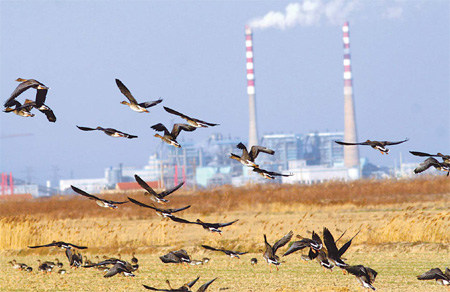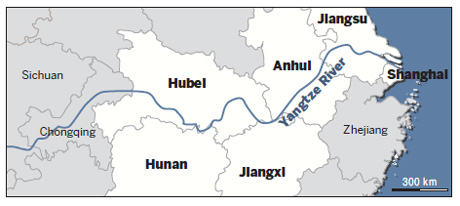|
|

Wintering bean geese gather on a reed field near Yancheng National Nature Reserve in Jiangsu province. Chen Liang / China Daily
|
|

Wang Hui records his sightings at Yancheng National Nature Reserve. Chen Liang / China Daily
|
Initial results from the third survey of the country's waterbird population in the Yangtze flood plains look positive, Chen Liang discovers.
The flood plains in the lower reaches of the Yangtze River, which stretch through Hubei, Hunan, Jiangxi, Anhui, and Jiangsu to Shanghai, are one of China's richest wetlands in terms of natural resources and waterbirds. In 2004, World Wildlife Fund (WWF) China Program and the State Forestry Administration launched the first comprehensive count of waterbirds in this region, to assess the deterioration of the wetlands, and followed this up with another in 2005.
They showed that farming, over-fishing and rapid development in lake areas were destroying the habitats of the birds, and affecting their food chain.
This year's count of waterbirds on the lower Yangtze River flood plain, that began in mid-January - when their numbers peak - remained incomplete until the second week of February, due to the Spring Festival break.
The count in Anhui was affected "by an earthquake in one of the survey areas and bad weather", says Lei Gang, head of Central Yangtze of the WWF China Program and coordinator of the project.
"(But) the populations of waterfowl are relatively stable in their wintering grounds when there is no significant human interference and interference is usually minimal during the holidays," he says in a telephone interview with China Daily. "So we think the delay won't have much influence on the results of our count."
The survey is aimed at providing valuable data on the populations of waterfowl, and their distribution and habitats, so meaningful comparisons can be made with results from the previous two surveys.
It will help the authorities obtain a clearer view of the status of waterbirds in the region, address major threats to them, and improve effective protection of the birds as well as the management of their habitats.
"With unprecedented levels of snow and freezing rain in the southern part of the country in early 2008, we want to know whether that disaster had any profound impact on the populations and distribution of wintering waterbirds," Lei says.
He and his colleagues are still waiting for figures from the teams in Anhui, Jiangxi and Shanghai. But initial results look positive, he says.
So far, 178,000 waterbirds have been recorded in Hunan and more than 68,000 in Hubei, Lei says. In 2004 and 2005, the figures were about 110,000 in Hunan and 50,000 in Hubei.
The conservationist also says that while they found large congregations of tundra swan only at Shengjin Lake in Anhui province and Boyang Lake in Jiangxi province in 2004 and 2005, good numbers of the bird have been seen in a few lakes of Hubei and Hunan this year.
The bird, together with the swan goose, is known to "be very picky about food" - their diet consists mainly of a particular kind of aquatic vegetation, which requires a good environment to grow.
"So it probably means an improvement in the water quality in more lakes in the region because of better protection in the past few years," Lei says.
Another important sighting is that of more than 170 Baer's pochards in Hubei.
The diving duck breeds in Southeast Russia and Northeast China, migrating in winter to southern China, Vietnam, Japan and India. It is classified as endangered as its numbers are estimated to have declined between 50 and 79 percent from 1998 to 2008, with their global population now standing at 5,000, according to the BirdLife International website.
"Here (Wuhan) in one lake, we counted more than 110 of these birds," Lei says. "It's certainly an important finding for the bird's research and conservation."
Excited by the find, Lei and his colleagues went to the lake and counted the birds again after the survey to "double check the figure", he says.
For conservationists working with the East Dongting Lake National Nature Reserve in Hunan province, the winter survey in Dongting Lake, one of the important flood-basins of the Yangtze River and a wintering ground for waterbirds, is routine work.
"To be honest, we didn't really expect to make any special find," says Yao Yi, head of the reserve's research department, who was in charge of Hunan's survey.
He attributed the increase of birds recorded in Hunan to an expansion of surveyed areas and good weather on the two survey days.
"We used to just focus on Dongting Lake but this year we went to several upstream reservoirs," he says. "It's usually either foggy or raining in winter, making it difficult to count birds. But it was extremely nice weather on Jan 11 and 12, which certainly helped us see more birds."
More than 30 participants from four nature reserves in the province recorded 56 species among nearly 180,000 birds, he says. Of them, six species - bean goose, lesser white-fronted goose, greater white-fronted goose, falcated duck, common teal and Dunlin - numbered more than 10,000. The numbers of four species - lesser white-fronted goose, Eurasian spoonbill, bean goose and falcated duck - accounted for more than 1 per cent of their global populations.
Although construction of a dam on the lake, poplar trees encroaching on the flood basin and over-fishing are still threatening the waterbird habitats around the lake, Yao says, the population of waterfowl remains stable. "This is a better result than any sharp rise or fall," he says.
The situation is somewhat different in Jiangsu province. Although Wang Hui and 20 of his colleagues recorded 58 species among more than 180,000 waterbirds, he still worries about what he saw during the survey.
According to the research department head of Yancheng National Nature Reserve who was in charge of the survey in Jiangsu, they traveled more than 4,000 km to visit more than 20 sites in the province in mid-January and found much evidence of the sharp change of waterbird habitats.
At the estuary of the Chuhe River, there used to be hundreds of gulls and waders, but there was "not one bird this year", he says, "because of the construction of a harbor".
At Shanghu Lake in Changshu, he once recorded more than 10,000 black-crowned night herons and dozens of mandarin ducks, but saw none of them this year, due to widespread tourism development.
The water quality at some lakes, such as Yangcheng Lake, is still good. But intensive crab farming has left hardly any space for birds, Wang says.
Weather remains a factor that could influence the final count, he says. In November, 2010, his team recorded more than 110,000 waterbirds in and around Hongze Lake, the largest waterbird habitat in the province.
During their survey in January, however, they counted only about 30,000 birds there. The lake was frozen and this probably pushed more of the migrating birds to the south, he says. "In 2005, the lake wasn't frozen even in February."
While surveying areas around the Yancheng reserve, the world's largest wintering ground for endangered red-crowned cranes, he and his colleagues recorded 49 red-crowned cranes, more than 1,800 common cranes and 600 bean geese, in one day.
"They live not only within the reserve, but also in farming areas and reed fields outside," he says. "Spring plowing with poisonous fertilizers, paper-making that uses reed as a raw material, and construction of a power plant threatens their wintering in the region.
"The survey shows how close they live to us, how fragile they are, and how heavy our responsibility is to protect them."

(China Daily 03/03/2011 page18)
|